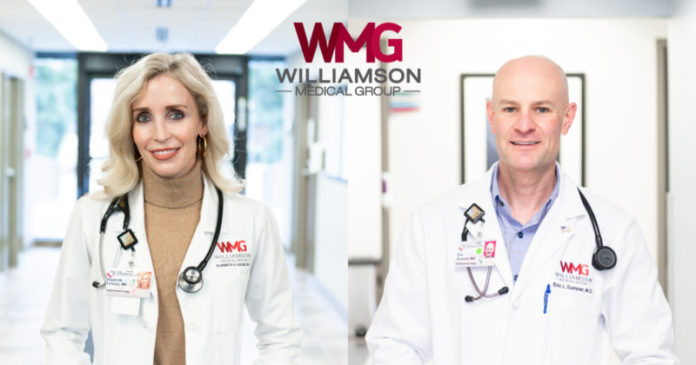March is Colorectal Cancer Awareness Month. According to the American Cancer Society, colorectal cancer—a term used to describe cancer that starts in the colon or the rectum— is the third leading cause of cancer-related deaths in men and in women, and the second most common cause of cancer deaths when men and women are combined. These cancers can also be called colon cancer or rectal cancer, depending on where they start.
A few simple lifestyle changes can help lower the risk for colon cancer. Eat a healthy diet with a variety of fruits, vegetables and whole grains. Exercise regularly and maintain a healthy weight. Alcohol use has been linked with a higher risk of colorectal cancer, so if you do choose to consume alcohol, the American Cancer Society recommends no more than two drinks a day for men and one drink a day for women.
Most colorectal cancers start as a growth on the inner lining of the colon or rectum. These growths are called polyps. Some types of polyps can change into cancer over time (usually many years), but not all polyps become cancer.
Colonoscopies, the most common screening procedure used to detect abnormalities in the large intestine and rectum, help lower the incidence of colorectal cancer by allowing doctors to remove polyps before they become cancerous. Since polyps can take as many as 10 to 15 years to develop into cancer, routine screenings allow doctors to detect and treat colorectal cancer before it spreads. While colonoscopies are not the only screening option available, they are highly recommended, since doctors can both detect and take steps to prevent cancer during the procedure.
Colorectal polyps and cancer often show no signs or symptoms right away, making routine screenings even more important. Symptoms that may suggest colon cancer include:
⦁ A change in bowel habits, such as diarrhea, constipation, or narrowing of the stool, that lasts for more than a few days
⦁ A feeling that you need to have a bowel movement that’s not relieved by having one
⦁ Rectal bleeding with bright red blood
⦁ Blood in the stool, which might make the stool look dark brown or black
⦁ Cramping or abdominal (belly) pain
⦁ Weakness and fatigue
⦁ Unintended weight loss
While everyone should be screened for colorectal cancer beginning at age 50, some people may need to begin the process a little earlier. The American Cancer Society now recommends that people at average risk of colorectal cancer start regular screening at age 45, but not all insurers cover the cost of colorectal cancer screening before age 50. Always contact your insurer to confirm coverage.
People who are in good health and with a life expectancy of more than 10 years should continue regular colorectal cancer screening through the age of 75. For people ages 76 through 85, the decision to be screened should be based on a person’s preferences, life expectancy, overall health, and prior screening history. People over 85 should no longer get colorectal cancer screening.
For screening, people are considered to be at average risk if they do not have:
⦁ A personal history of colorectal cancer or certain types of polyps
⦁ A family history of colorectal cancer
⦁ A personal history of inflammatory bowel disease (ulcerative colitis or Crohn’s disease)
⦁ A confirmed or suspected hereditary colorectal cancer syndrome, such as familial adenomatous polyposis (FAP) or Lynch syndrome (hereditary non-polyposis colon cancer or HNPCC)
⦁ A personal history of getting radiation to the abdomen (belly) or pelvic area to treat a prior cancer
Patients who have a personal or family history of colorectal cancer, inflammatory bowel disease, or are experiencing symptoms may be considered high risk and should speak with their healthcare providers.
There’s no reason to fear or delay getting your screening colonoscopy. Patients are asked to consume a clear liquid diet the day before their colonoscopies and are instructed to take a laxative the evening prior to the procedure. Patients are sedated for the exam, and most people only need to take off work for the day of the exam. In many cases, the procedure can be completed in as little as 15-20 minutes.
Williamson Medical Group’s gastroenterologists, Elizabeth Lindsey, M.D. and Eric Sumner, M.D., are board-certified specialists who are passionate about the importance of getting screened for colorectal cancer and providing peace of mind to their patients. Williamson Medical Group utilizes state-of-the-art technology to perform procedures including colonoscopy, flexible sigmoidoscopy, upper endoscopy and endoscopic ultrasound.
Take action today! Simple lifestyle changes such as a healthy diet and exercise may help reduce your risk, but routine screenings play a crucial role in preventing and successfully treating colorectal cancer.
To schedule your colorectal cancer screening, or learn more about Williamson Medical Group’s gastroenterology services, please visit WilliamsonMedicalCenter.org/Colonoscopy or call (615) 435-7979.
Have a question for Williamson Medical Center? Fill out the form below.
Please join our FREE Newsletter



















